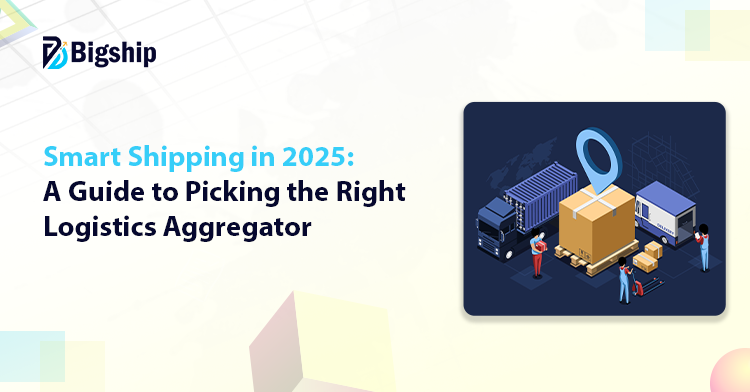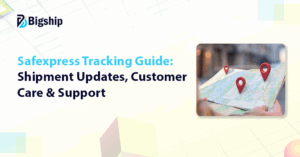Businesses managing logistics for their shipments on their own often face delays, higher costs, and inefficiencies due to courier coordination issues, data errors, and restricted growth potential. So, this is where logistics aggregators step in.

Logistics aggregators integrate multiple courier services into one platform, not only allowing businesses to compare rates but also enhancing the speed and accuracy of their deliveries. Unlike managing shipping manually, this offers a clear improvement in the quality and responsiveness of operations.
In this blog, we will explain what a logistics aggregator is, why businesses plan to adopt it in 2025, and the problems faced in managing shipping manually.
What is a logistics aggregator?
A logistics aggregator provides a digital platform that streamlines access to shipment and courier services for businesses by providing them access to multiple courier and shipment service providers through a single dashboard. With a logistics aggregator, businesses can compare multiple providers’ pricing, delivery schedules, and service coverage and pick the best one for every parcel.
This approach gives businesses more choices, reduces risk, and helps manage expenses. Along with these benefits, most aggregators also offer premium features like automatic ordering from e-commerce stores, shipment tracking in real time, bulk label creation, invoicing, and the management of returns and delivery failure processes. Not only do these functions help streamline processes, but they also boost delivery metrics, making logistics aggregators essential for small businesses, D2C companies, and online merchants who want to grow sustainably.
How does it differ from a courier company?
Typically, businesses rely on a single courier for their deliveries, such as BlueDart, Delhivery, or FedEx. These couriers offer end-to-end shipment services, pick-up to delivery, but are confined to their individual pricing structure, service areas, and operational capacity. There is a lack of choice for enterprises when it comes to enduring the consequences should the courier face delays, service gaps, or higher charges.
A logistics aggregator operates with multiple partners. Having an aggregator does not limit you to a single courier; instead, you gain multiple couriers on a single platform. This enables:
- Avoiding unnecessary expenditure by comparing shipping prices instantly.
- Selecting couriers based on their service areas, such as expedited services to metros or dependable deliveries in tier-2 and tier-3 areas.
- Mitigating risks as a result of sending shipments using multiple partners that guarantee no single point of failure.
- Growing without hassle, as additional hyperlocal, domestic, and international shipping integrations are provided by the aggregator without the need for separate partnerships.
Key factors to consider before picking a logistics aggregator
1. Service Coverage & Network Strength
Before selecting a logistics aggregator, examine their service coverage and network strength. The logistics aggregator must show dependable tracking, pick-up, and delivery capabilities for different shipment types, such as hyperlocal within a city, domestic across India, or cross-border shipment to international destinations.
Pan-India service coverage provides quicker access to tier-1, tier-2, and even far-flung pin codes. Regional service coverage helps businesses cover particular states or zones. International shipping services enable merchants to ship worldwide without having to handle multiple courier partnerships.
2. Pricing & Cost Transparency
Pricing is a known concern, and with it being the main concern, the logistics aggregator’s pricing provides a more comprehensive concern. A good aggregator should provide multi-courier partner shipping rates in real-time so the business can, in an instant, choose the cheapest shipping alternative for each shipment.
It’s also essential to check for hidden charges such as fuel surcharges, RTO (Return to Origin) fees, or cancellation fees that could increase the shipping costs. Businesses stand a better chance of managing budgets with clear, upfront pricing from an aggregator.
3. Technology & Integration
An effective logistics aggregator is backed by solid technology designed to streamline the daily challenges of logistics. Such platforms should offer ready integrations, connectors, or APIs for popular e-commerce platforms such as Shopify, WooCommerce, and Magento, allowing for effortless and automatic order synchronization and shipping.
Advanced features like NDR (Non-Delivery Report) management, real-time tracking, and automation of invoicing not only keep the end customers updated as to the delivery status but also time delivery errors to the business. Tech integration in general allows for easier operations scaling and, in general, smoother logistics.
4. Delivery Speed & Flexibility
Delivery speed is a key factor to the overall customer experience, therefore, a trustworthy logistics aggregator should not only allow for express, same-day, and hyperlocal deliveries but also provide delivery windows for these hyper-local deliveries, ranging from 30 minutes to 4 hours, to cater to urgent, citywide deliveries. For companies dealing with large shipments, managed escalations through PTL (Partial Truck Load) and LTL (Less Than Truck Load) shipping are vital so as to curb bulk shipment costs without the need of having multiple providers.
5. Reliability & Track Record
Before agreeing to an aggregator, it’s important to look after the delivery success rate, average RTO percentage, and consistency in meeting promised timelines. How is an aggregator’s reliability checked? It is confirmed with reviews, case studies, and testimonials of companies in the same domain. Moreover, asking for performance reports that show delivery accuracy and RTO metrics should be helpful.
6. Customer Support & Communication
Logistics challenges can come up due to various reasons, which implies the need for customer support that responds immediately. In addition, a trustworthy aggregator must provide customer support on the phone, updates through WhatsApp, and even proactive communication through a dedicated account manager to solve issues quickly. This not only enables seamless functionality but also earns the confidence of both the seller and the buyer.
7. Scalability & Value-Added Services
As a business expands, the nature and the requirements of shipping change. A strong aggregator must not only provide COD handling, shipment insurance, and PTL/LTL, but must also manage a rush in peak season smoothly, without any delays or breakdowns. This ability to scale ensures that businesses can grow without worries while maintaining delivery efficiency.
What are the common mistakes to avoid?
When choosing a logistics aggregator, businesses often make mistakes that affect their efficiency and costs in the long run. A good aggregator not only streamlines processes but also improves delivery performance, making it valuable for small businesses, D2C brands, and online sellers aiming for sustainable growth. Common mistakes include:
- The least expensive choice is not always the best one. Quality of service, delivery speed, and reliability are also important and can be ignored, resulting in higher RTOs and deteriorated customer experience.
- Skipping a trial run means customer support, integrations, tracking, or other essential services might have faults that go unnoticed. It is advisable to always attempt a trial run.
- Ignoring the details of contracts and SLAs (Service Level Agreements) can result in unclear responsibilities, hidden costs, or shallow service coverage.
Why Bigship is the smarter choice for businesses?
In the modern business world, companies need more than a delivery partner, they need a solution that actively supports their development. Bigship is more than just a courier aggregator it is a tech platform that integrates a vast delivery network with advanced tools and truly dedicated customer support. Shipping becomes not only a simple operational task, but a strategically profitable game of clear margins and low risk. This is how Bigship makes the difference in 2025:
- Integrated Couriers: Having 30+ courier partners and covering 29,000+ pincode areas, Bigship guarantees widespread reach and higher chances of successful deliveries, lowering the chance of shipments failing or being returned.
- Optimal Pricing: Every shipping order is subjected to dynamic price comparison, which enables the business to choose the lowest available price that meets their standards. This is especially helpful in preserving and protecting profit margins during peak seasons.
- Faster Deliveries: Faster shipping is an integral part of customer expectations, and with Bigship’s same-day and next-day shipping, buyer delight is ensured even during high-demand periods.
- Intelligent NDR Processing: Manual and automated escalations, IVR, and WhatsApp follow-ups significantly cut RTO (Return to Origin) losses and improve NDR (non-delivery reports) tracking.
- Monitoring & Informing: Real-time shipment monitor and tracking increases consumer loyalty, with alerts on changes in schedule and EDD (expected delivery date) informing buyers at all times.
- Dedicated Account Manager: An active Key Account Manager with a proactive approach is assigned to every company, offering hands-on help during high shipping volumes, quick solutions, and expert advice.
- Festive-Ready Features: Bigship is equipped to deal with seasonal spikes and festive rushes with early COD payments, multi-channel integrations, and a single dashboard controlling all shipments.
Bigship gives confidence to SMEs, D2C brands, and marketplace sellers to expand, thanks to its network strength, clear pricing, and innovative technology, coupled with committed assistance. In 2025, Bigship evolves from being merely an aggregator to a growth partner, guaranteeing that every shipment boosts your business success.
Conclusion
Selecting the appropriate logistics aggregator has a significant impact on your business’s success. With the right partner, not only do you save on shipping costs, but your deliveries are faster and your customers are more satisfied. On the other hand, the wrong partner means late deliveries, increasing RTOs, and lost chances.
In contrast to either handling shipping yourself or relying on a single courier, a logistics aggregator offers flexibility, clarity, and dependability by tying you with various couriers through a single platform.
When it comes to selecting the best one, Bigship is the ideal option. Its 30+ courier partners, rate comparison features, intelligent NDR management, real-time tracking, dedicated account managers, and features for the festive season are all designed not only to help you manage your logistics but also to help you scale your business.
Sign up to make smarter shipments with Bigship and transition logistics from an obstacle to a strategic strength.





